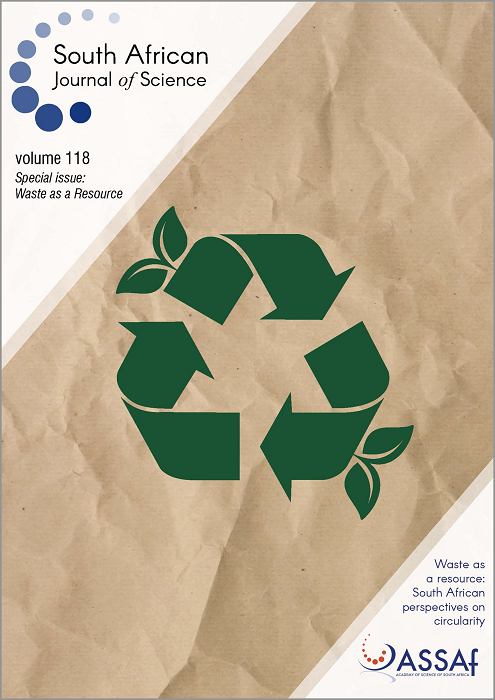Transitioning towards a circular bioeconomy in South Africa: Who are the key players?
DOI:
https://doi.org/10.17159/sajs.2022/12465Keywords:
circular bioeconomy, organic waste, waste economy, waste treatmentAbstract
The transition towards a circular economy is becoming a priority in many countries globally. However, the circular bioeconomy has received relatively less attention. In South Africa, the valorisation of organic waste is a priority area as demonstrated by national goals to divert organic waste from landfill. To support the growth of the organic waste value chain it is important to gain an understanding of the different value chain actors and their activities. Through a series of semi-structured interviews across the industry, this paper unpacks the organic waste value chain including the roles of different actors and the interlinkages amongst them. Interviewed actors were those involved in the waste treatment sector, including consultants, composters and technology providers and installers. The value chain is characterised by a number of partnerships, including sub-contracting and outsourcing, which enable value chain actors to offer services that they do not necessarily have the in-house skills or capacity to deliver on their own. The majority of actors were not directly engaged in activities related to the treatment of waste, with many of them engaging in support activities to facilitate the treatment of waste. This finding may be attributed to the fact that support activities have relatively lower barriers to entry. This has the potential to create a bottleneck, in which there will be limited capacity for waste treatment as new entrants opt for engaging in support activities. Greater investment is needed from both private and public sources in the waste treatment sector, including support for new entrants. This investment will help enable the country to meet its goals for organic waste diversion whilst contributing to job creation.
Significance:
- The majority of participants in the organic waste value chain were engaged in support activities.
- The organic waste value chain is characterised by a series of partnerships.
- Greater investment is needed for the development of waste treatment facilities.
Published
Issue
Section
License

All articles are published under a Creative Commons Attribution 4.0 International Licence
Copyright is retained by the authors. Readers are welcome to reproduce, share and adapt the content without permission provided the source is attributed.
Disclaimer: The publisher and editors accept no responsibility for statements made by the authors
How to Cite
- Abstract 644
- PDF 789
- EPUB 272
- XML 325
Funding data
-
National Research Foundation
Grant numbers 128149












.png)